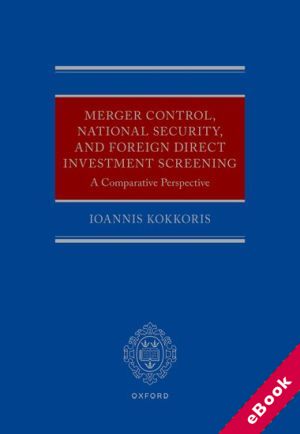
The device(s) you use to access the eBook content must be authorized with an Adobe ID before you download the product otherwise it will fail to register correctly.
For further information see https://www.wildy.com/ebook-formats
Once the order is confirmed an automated e-mail will be sent to you to allow you to download the eBook.
All eBooks are supplied firm sale and cannot be returned. If you believe there is a fault with your eBook then contact us on ebooks@wildy.com and we will help in resolving the issue. This does not affect your statutory rights.
The Covid-19 pandemic, the significant expansion of the Chinese investment abroad, and recent geo-political tensions have all served to strengthen national security considerations in merger control and foreign direct investment (FDI) processes. Against this backdrop, Merger Control, National Security, and Foreign Direct Investment Screening: A Comparative Perspective provides a comprehensive exploration of the intricate interplay between national security, foreign direct investment, and competition policy in an increasingly interconnected global economy.
Central to the book's analysis is the exploration of FDI screening mechanisms from a national security perspective as they apply to Merger and Acquisition (M&A) transactions. Spanning a wide array of jurisdictions, industries, and policy contexts, including case studies from major economies such as the European Union, the United Kingdom, the United States, and China, the book examines how lawmakers navigate protecting their strategic sectors while promoting a welcoming environment for investors. It also showcases how competition authorities grapple with incorporating broader societal goals and national security concerns into merger control assessments.
Merger Control, National Security, and Foreign Direct Investment Screening scrutinizes the challenges of balancing these objectives while maintaining the integrity of competition law principles and avoiding undue political influence. It offers a thought-provoking and timely guide for policymakers, practitioners, scholars, and stakeholders seeking to navigate the intricacies of global economic interdependence without dismissing national interests.